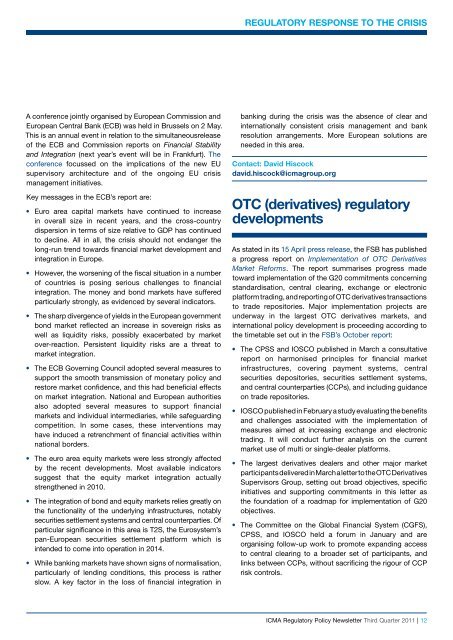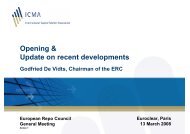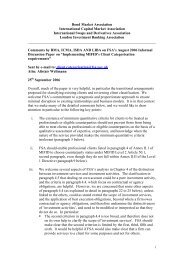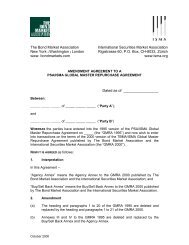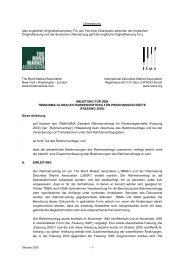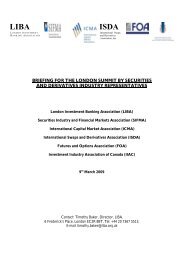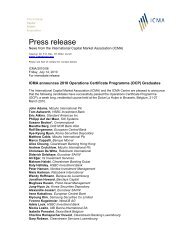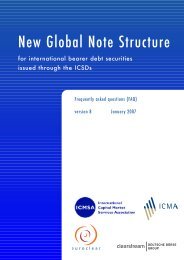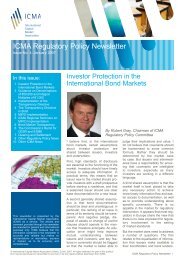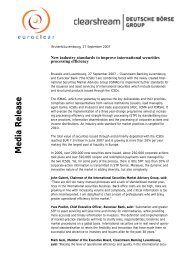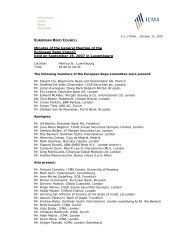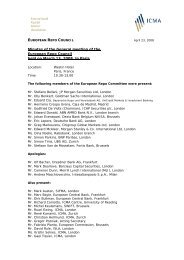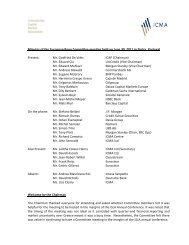Issue no. 22: ICMA Regulatory Policy Newsletter
Issue no. 22: ICMA Regulatory Policy Newsletter
Issue no. 22: ICMA Regulatory Policy Newsletter
Create successful ePaper yourself
Turn your PDF publications into a flip-book with our unique Google optimized e-Paper software.
A conference jointly organised by European Commission and<br />
European Central Bank (ECB) was held in Brussels on 2 May.<br />
This is an annual event in relation to the simultaneousrelease<br />
of the ECB and Commission reports on Financial Stability<br />
and Integration (next year’s event will be in Frankfurt). The<br />
conference focussed on the implications of the new EU<br />
supervisory architecture and of the ongoing EU crisis<br />
management initiatives.<br />
Key messages in the ECB’s report are:<br />
• Euro area capital markets have continued to increase<br />
in overall size in recent years, and the cross-country<br />
dispersion in terms of size relative to GDP has continued<br />
to decline. All in all, the crisis should <strong>no</strong>t endanger the<br />
long-run trend towards financial market development and<br />
integration in Europe.<br />
• However, the worsening of the fiscal situation in a number<br />
of countries is posing serious challenges to financial<br />
integration. The money and bond markets have suffered<br />
particularly strongly, as evidenced by several indicators.<br />
• The sharp divergence of yields in the European government<br />
bond market reflected an increase in sovereign risks as<br />
well as liquidity risks, possibly exacerbated by market<br />
over-reaction. Persistent liquidity risks are a threat to<br />
market integration.<br />
• The ECB Governing Council adopted several measures to<br />
support the smooth transmission of monetary policy and<br />
restore market confidence, and this had beneficial effects<br />
on market integration. National and European authorities<br />
also adopted several measures to support financial<br />
markets and individual intermediaries, while safeguarding<br />
competition. In some cases, these interventions may<br />
have induced a retrenchment of financial activities within<br />
national borders.<br />
• The euro area equity markets were less strongly affected<br />
by the recent developments. Most available indicators<br />
suggest that the equity market integration actually<br />
strengthened in 2010.<br />
• The integration of bond and equity markets relies greatly on<br />
the functionality of the underlying infrastructures, <strong>no</strong>tably<br />
securities settlement systems and central counterparties. Of<br />
particular significance in this area is T2S, the Eurosystem’s<br />
pan-European securities settlement platform which is<br />
intended to come into operation in 2014.<br />
• While banking markets have shown signs of <strong>no</strong>rmalisation,<br />
particularly of lending conditions, this process is rather<br />
slow. A key factor in the loss of financial integration in<br />
REGULATORY RESPONSE TO THE CRISIS<br />
banking during the crisis was the absence of clear and<br />
internationally consistent crisis management and bank<br />
resolution arrangements. More European solutions are<br />
needed in this area.<br />
Contact: David Hiscock<br />
david.hiscock@icmagroup.org<br />
OTC (derivatives) regulatory<br />
developments<br />
As stated in its 15 April press release, the FSB has published<br />
a progress report on Implementation of OTC Derivatives<br />
Market Reforms. The report summarises progress made<br />
toward implementation of the G20 commitments concerning<br />
standardisation, central clearing, exchange or electronic<br />
platform trading, and reporting of OTC derivatives transactions<br />
to trade repositories. Major implementation projects are<br />
underway in the largest OTC derivatives markets, and<br />
international policy development is proceeding according to<br />
the timetable set out in the FSB’s October report:<br />
• The CPSS and IOSCO published in March a consultative<br />
report on harmonised principles for financial market<br />
infrastructures, covering payment systems, central<br />
securities depositories, securities settlement systems,<br />
and central counterparties (CCPs), and including guidance<br />
on trade repositories.<br />
• IOSCO published in February a study evaluating the benefits<br />
and challenges associated with the implementation of<br />
measures aimed at increasing exchange and electronic<br />
trading. It will conduct further analysis on the current<br />
market use of multi or single-dealer platforms.<br />
• The largest derivatives dealers and other major market<br />
participants delivered in March a letter to the OTC Derivatives<br />
Supervisors Group, setting out broad objectives, specific<br />
initiatives and supporting commitments in this letter as<br />
the foundation of a roadmap for implementation of G20<br />
objectives.<br />
• The Committee on the Global Financial System (CGFS),<br />
CPSS, and IOSCO held a forum in January and are<br />
organising follow-up work to promote expanding access<br />
to central clearing to a broader set of participants, and<br />
links between CCPs, without sacrificing the rigour of CCP<br />
risk controls.<br />
<strong>ICMA</strong> <strong>Regulatory</strong> <strong>Policy</strong> <strong>Newsletter</strong> Third Quarter 2011 | 12


